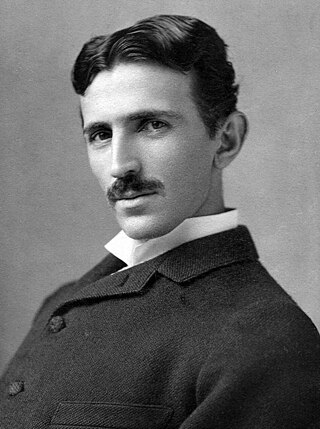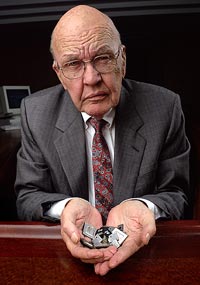
Alexander Graham Bell was a Scottish-born Canadian-American inventor, scientist and engineer who is credited with patenting the first practical telephone. He also co-founded the American Telephone and Telegraph Company (AT&T) in 1885.

Nikola Tesla was a Serbian-American inventor, electrical engineer, mechanical engineer, and futurist. He is best-known for his contributions to the design of the modern alternating current (AC) electricity supply system.

William Bradford Shockley Jr. was an American inventor, physicist, and eugenicist. He was the manager of a research group at Bell Labs that included John Bardeen and Walter Brattain. The three scientists were jointly awarded the 1956 Nobel Prize in Physics for "their researches on semiconductors and their discovery of the transistor effect".

Philo Taylor Farnsworth was an American inventor and television pioneer. He made many crucial contributions to the early development of all-electronic television. He is best known for his 1927 invention of the first fully functional all-electronic image pickup device, the image dissector, as well as the first fully functional and complete all-electronic television system. Farnsworth developed a television system complete with receiver and camera—which he produced commercially through the Farnsworth Television and Radio Corporation from 1938 to 1951, in Fort Wayne, Indiana.

An invention is a unique or novel device, method, composition, idea or process. An invention may be an improvement upon a machine, product, or process for increasing efficiency or lowering cost. It may also be an entirely new concept. If an idea is unique enough either as a stand-alone invention or as a significant improvement over the work of others, it can be patented. A patent, if granted, gives the inventor a proprietary interest in the patent over a specific period of time, which can be licensed for financial gain.

Jack St. Clair Kilby was an American electrical engineer who took part, along with Robert Noyce of Fairchild Semiconductor, in the realization of the first integrated circuit while working at Texas Instruments (TI) in 1958. He was awarded the Nobel Prize in Physics on 10 December 2000.
Discovery Channel is a Canadian discretionary specialty television channel owned by CTV Specialty Television Inc. and Warner Bros. Discovery.
An inventor's notebook is used by inventors, scientists and engineers to record their ideas, invention process, experimental tests and results and observations. It is not a legal document but is valuable, if properly organized and maintained, since it can help establish dates of conception and reduction to practice. It may be considered as grey literature. The information can improve the outcome of a patent or a patent contestation.
Within the context of a national or multilateral body of law, an invention is patentable if it meets the relevant legal conditions to be granted a patent. By extension, patentability also refers to the substantive conditions that must be met for a patent to be held valid.
Intellectual Ventures is an American private equity company that centers on the development and licensing of intellectual property. Intellectual Ventures is one of the top-five owners of U.S. patents, as of 2011. Its business model focuses on buying patents and aggregating those patents into a large patent portfolio and licensing these patents to third parties. The company has been described as the country's largest and most notorious patent trolling company, the ultimate patent troll, and the most hated company in tech.
First to file and first to invent are legal concepts that define who has the right to the grant of a patent for an invention. Since 16 March 2013, after the USA abandoned its "first to invent/document" system, all countries have operated under the "first-to-file" patent priority requirement.
Business method patents are a class of patents which disclose and claim new methods of doing business. This includes new types of e-commerce, insurance, banking and tax compliance etc. Business method patents are a relatively new species of patent and there have been several reviews investigating the appropriateness of patenting business methods. Nonetheless, they have become important assets for both independent inventors and major corporations.
In patent law, an inventor is the person, or persons in United States patent law, who contribute to the claims of a patentable invention. In some patent law frameworks, however, such as in the European Patent Convention (EPC) and its case law, no explicit, accurate definition of who exactly is an inventor is provided. The definition may slightly vary from one European country to another. Inventorship is generally not considered to be a patentability criterion under European patent law.

Willard Sterling Boyle, was a Canadian physicist. He was a pioneer in the field of laser technology and co-inventor of the charge-coupled device. As director of Space Science and Exploratory Studies at Bellcomm he helped select lunar landing sites and provided support for the Apollo space program.
American Inventor was a reality television series based on a competition to be named America's best inventor. It was conceived by Simon Cowell and the producers of American Idol, and premiered on ABC in March, 2006. It was organized as a competition between inventors nationally, resulting in one overall winner.
LabCorp v. Metabolite, Inc., 548 U.S. 124 (2006), is the first case since Diamond v. Chakrabarty in which the U.S. Supreme Court indicated a renewed interest in examining the limits of patentable subject matter for advances in life sciences. Although the Court initially agreed to hear the case, it was later dismissed in 2006 with three Justices dissenting. The defendant's petition to the Supreme Court raised an issue not addressed in opinions from the lower courts: the claim at issue was directed to patent ineligible subject matter and therefore invalid.

Otis Frank Boykin was an American inventor and engineer. His inventions include electrical resistors used in computing, missile guidance, and pacemakers.

Robert W. Gore was an American engineer and scientist, inventor and businessman. Gore led his family's company, W. L. Gore & Associates, in developing applications of polytetrafluoroethylene (PTFE) ranging from computer cables to medical equipment to the outer layer of space suits. His most significant breakthrough was likely the invention of Gore-Tex, a waterproof and breathable fabric popularly known for its use in sporting and outdoor gear.
The Re-Inventors is a Canadian TV show based around exploring historic inventions and testing them. The show follows the hosts, Matt Hunter and Jeremy MacPherson, as they discover and reconstruct inventions to see how ideas from the past hold up in the present world. In each episode, the hosts choose a historic invention and attempt to rebuild it. The hosts would examine the original patent information, including blueprints, then, along with additional tradesmen as needed, build the prototypes, and test each of these, often strange, inventions to see if any could actually succeed. Often, a few related inventions would be tested in the same episode. Each invention was given a set of evaluation criteria before being tested. At the end of the episode, the invention was graded and if the invention was considered to have met the evaluation criteria, it was granted the title of 'Patent Approved'. If the invention proved to be less than effective, it was granted the title 'Patent Denied'.









